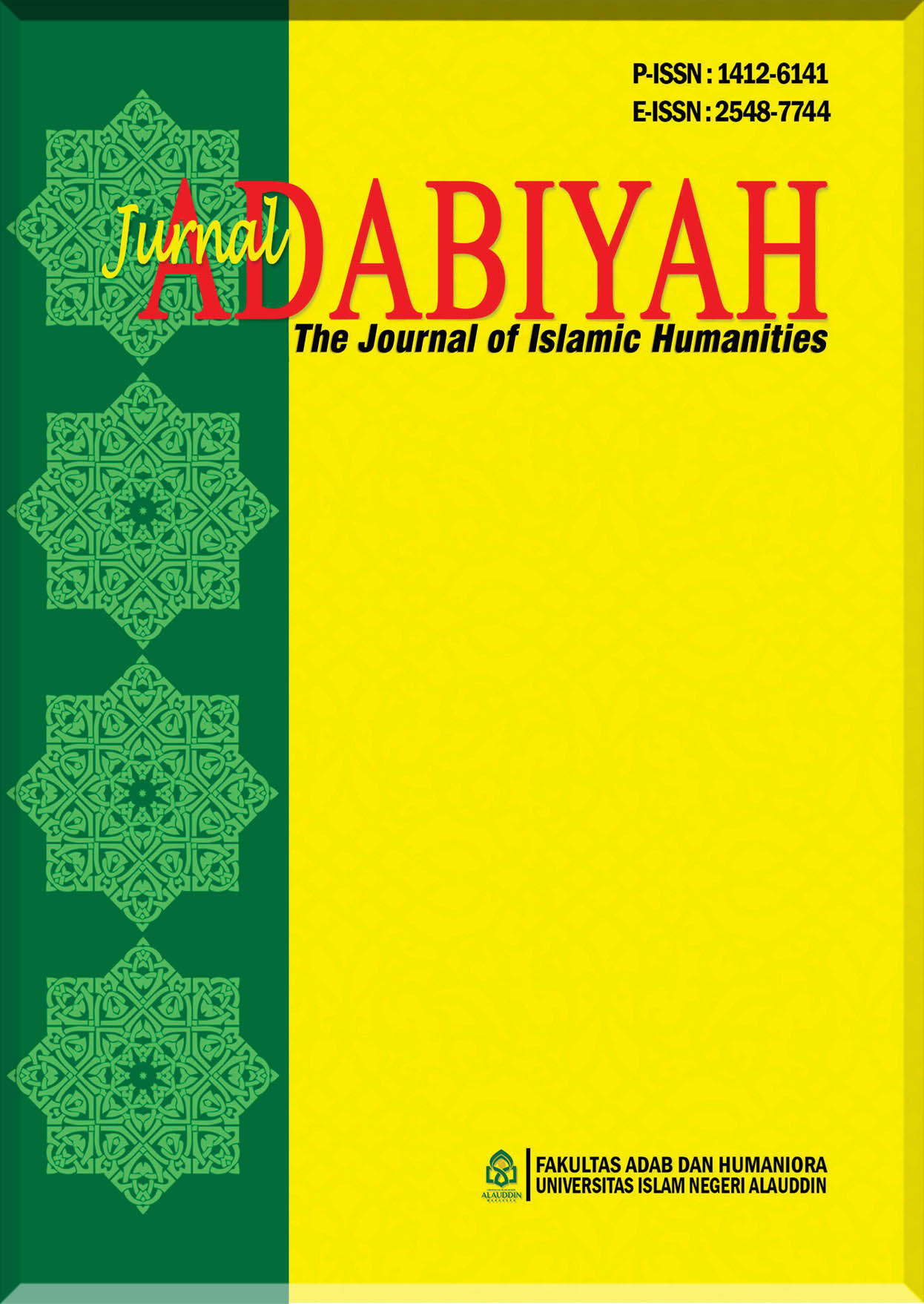Suggesting the Semiotics of the Qur'an: Critical Study of Muhammad Arkoun's Revelation Reason
DOI:
https://doi.org/10.24252/jad.v25i1a6Keywords:
Semiotics of the Qur'an, Muhammad Arkoun, Reason of RevelationAbstract
Muhammad Arkoun, a controversial liberal Muslim figure, has attracted the attention of many researchers with his innovative approach to understanding revelation through semiotic analysis. This research aims to critically analyse how Arkoun reads Qur'anic texts using a semiotic approach, as well as its impact on religious understanding. The research method used is descriptive qualitative with a critical analysis approach, which combines eclectic approaches, postmodernism, and tafsir science. The results show that Arkoun tries to subjugate the Qur'an within the framework of linguistic analysis that is heavily influenced by western thought. With this approach, he ignores classical and contemporary Islamic methodologies, preferring to focus on the western intellectual way of thinking that separates revelation from its transcendence dimension. Arkoun argues that the reading of the Qur'an should follow global intellectual dynamics, although his views are widely considered incompatible by more conservative circles. This study hopes that Arkoun's thought can provide a new perspective for Muslim academics in the West, especially in criticising the theoretical paradigm imposed by the Western intellectual tradition. However, for ordinary people who study religion with a simpler understanding, Arkoun's thinking tends to be regarded as a dangerous theological heresy.
الملخص
استقطب محمد أركون، وهو شخصية مسلمة ليبرالية ليبرالية مثيرة للجدل، اهتمام العديد من الباحثين بمنهجه المبتكر لفهم الوحي من خلال التحليل السيميائي. يهدف هذا البحث إلى تحليل نقدي لكيفية قراءة أركون للنصوص القرآنية باستخدام المنهج السيميائي، وكذلك أثره على الفهم الديني. ومنهج البحث المستخدم هو المنهج الوصفي الكيفي مع منهج التحليل النقدي الذي يجمع بين المناهج الانتقائية وما بعد الحداثة وعلم التفسير. وتظهر النتائج أن أركون يحاول إخضاع القرآن في إطار التحليل اللغوي المتأثر بشدة بالفكر الغربي. وهو بهذا المنهج يتجاهل المنهجيات الإسلامية الكلاسيكية والمعاصرة، مفضلاً التركيز على الطريقة الفكرية الغربية في التفكير التي تفصل الوحي عن بعده المتعالي. يجادل أركون بأن قراءة القرآن يجب أن تتبع الديناميات الفكرية العالمية، على الرغم من أن آراءه تعتبرها الأوساط الأكثر تحفظًا غير متوافقة على نطاق واسع. وتأمل هذه الدراسة أن يقدم فكر أركون منظورًا جديدًا للأكاديميين المسلمين في الغرب، خاصة في نقد النموذج النظري الذي يفرضه التقليد الفكري الغربي. ومع ذلك، بالنسبة للأشخاص العاديين الذين يدرسون الدين بفهم أبسط، يميل فكر أركون إلى اعتباره بدعة لاهوتية خطيرة.
Abstrak
Muhammad Arkoun, seorang tokoh Muslim liberal yang kontroversial, menarik perhatian banyak peneliti dengan pendekatannya yang inovatif dalam memahami wahyu melalui analisis semiotika. Penelitian ini bertujuan untuk menganalisis secara kritis bagaimana Arkoun membaca teks-teks al-Qur’an dengan menggunakan pendekatan semiotika, serta dampaknya terhadap pemahaman keagamaan. Metode penelitian yang digunakan adalah deskriptif kualitatif dengan pendekatan analisis kritis, yang memadukan pendekatan eklektik, postmodernisme, dan ilmu tafsir. Hasil penelitian menunjukkan bahwa Arkoun mencoba menundukkan al-Qur’an dalam kerangka analisis linguistik yang sangat dipengaruhi oleh pemikiran barat. Dengan pendekatan ini, ia mengabaikan metodologi klasik dan kontemporer Islam, lebih memilih untuk fokus pada cara berpikir intelektual barat yang memisahkan wahyu dari dimensi transendensinya. Arkoun berargumen bahwa pembacaan al-Qur’an harus mengikuti dinamika intelektual global, meskipun pandangannya ini banyak dianggap tidak sesuai oleh kalangan yang lebih konservatif. Penelitian ini mengharapkan agar pemikiran Arkoun dapat memberi perspektif baru bagi akademisi Muslim di Barat, khususnya dalam mengkritisi paradigma teori yang dipaksakan oleh tradisi intelektual Barat. Namun, bagi masyarakat awam yang mendalami agama dengan pemahaman yang lebih sederhana, pemikiran Arkoun cenderung dianggap sebagai bid’ah teologis yang berbahaya.
Downloads
References
Al-Jabiri, Mohammad Abid. Arab Reasoning: A Critical Study of the Formation of Arab Thought. Beirot: Dar al-Tanwir, 1998.
Al-Suyuthi, Jalaluddin. Al-Itqan Fi Ulum al-Qur’an. Beirut: Dar Al-Fikr, 1998.
Arkoun, Mohammed. Rethinking Islam: Common Questions, Uncommon Answers. Edited by Robert D. Lee. 1st edition. Boulder: Routledge, 1994.
———. The Unthought In Contemporary Islamic Thought. London: Saqi Books, 2002.
Az-Zarkasyi, Badruddin Muhammad bin Abdullah. Al-Burhan Fi Ulumil Qur’an. Vol. 1. Beirut: Darul Fikr, 2009.
Dzukroni, Arisy Abror. “Integrasi Ilmu Keislaman dan Sosial Humaniora dalam Studi Islam: Kritik Epistemologi Muhammad Arkoun terhadap Metodologi Studi Islam.” AT-TURAS: Jurnal Studi Keislaman 9, no. 1 (June 30, 2022): 142–64. https://doi.org/10.33650/at-turas.v9i1.3712.
Esack, Farid. Qur’an, Liberation and Pluralism: An Islamic Perspective of Interriligious olidarity against Oppression. Oxford: Oneword,1997.
Downloads
Published
How to Cite
Issue
Section
License
Copyright (c) 2025 Mukhtar, Rahman, Khairuddin, Wasalmi, Suhaimi, Usman

This work is licensed under a Creative Commons Attribution-NonCommercial-ShareAlike 4.0 International License.
COPYRIGHT AND LICENSE STATEMENT
COPYRIGHT
Jurnal Adabiyah is published under the terms of the Creative Commons Attribution license. Authors hold the copyright and retain publishing rights without restriction to their work. Users may read, download, copy, distribute, and print the work in any medium, provided the original work is properly cited.
LICENSE TO PUBLISH
1. License
The use of the article will be governed by the Creative Commons Attribution license as currently displayed on http://creativecommons.org/licenses/by/4.0.
2. Author’s Warranties
The author warrants that the article is original, written by stated author/s, has not been published before, contains no unlawful statements, does not infringe the rights of others, is subject to copyright that is vested exclusively in the author and free of any third party rights, and that any necessary written permissions to quote from other sources have been obtained by the author(s).
3. User Rights
Under the Creative Commons Attribution license, the users are free to download, reuse, reprint, modify, distribute and/or copy the content for any purpose, even commercially, as long as the original authors and source are cited. No permission is required from the authors or the publishers.
4. Co-Authorship
If the article was prepared jointly with other authors, the corresponding author warrants that he/she has been authorized by all co-authors, and agrees to inform his/her co-authors of the terms of this statement.
5. Miscellaneous
Jurnal Adabiyah may conform the article to a style of punctuation, spelling, capitalization, and usage that it deems appropriate. The author acknowledges that the article may be published so that it will be publicly accessible and such access will be free of charge for the readers.




